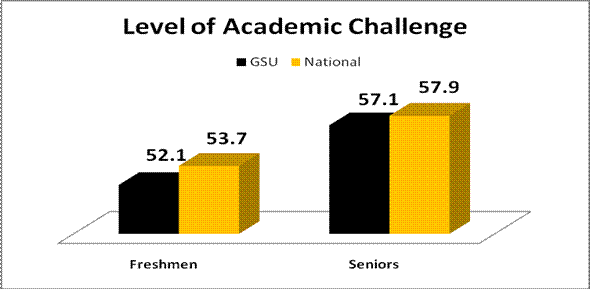Level of Academic Challenge (LAC) Items
 Challenging intellectual and creative work is central to student learning and collegiate
quality. Colleges and universities promote high levels of student achievement by emphasizing
the importance of academic effort and setting high expectations for student performance.
Challenging intellectual and creative work is central to student learning and collegiate
quality. Colleges and universities promote high levels of student achievement by emphasizing
the importance of academic effort and setting high expectations for student performance.
- Hours spent preparing for class (studying, reading, writing, doing homework or lab
work, etc. related to academic program)
- Number of assigned textbooks, books, or book-length packs of course readings
- Number of written papers or reports of 20 pages or more, between 5 and 19 pages, and fewer than 5 pages
- Coursework emphasizes: Analysis of the basic elements of an idea, experience or theory
- Coursework emphasizes: Synthesis and organizing of ideas, information, or experiences into new, more complex interpretations
and relationships
- Coursework emphasizes: Making of judgments about the value of information, arguments, or methods
- Coursework emphasizes: Applying theories or concepts to practical problems or in new situations
- Working harder than you thought you could to meet an instructor’s standards or expectations
- Campus environment emphasizes: Spending significant amount of time studying and on
academic work

Results of the survey are divided into five Benchmarks of Effective Educational Practices.
Click the links below for definitions of NSSE measures and survey results.
- Level of Academic Challenge
- Active and Collaborative Learning
- Student-Faculty Interaction
- Enriching Educational Experiences
- Supportive Campus Environment
RESOURCE LINK
National Survey of Student Engagement
 Challenging intellectual and creative work is central to student learning and collegiate
quality. Colleges and universities promote high levels of student achievement by emphasizing
the importance of academic effort and setting high expectations for student performance.
Challenging intellectual and creative work is central to student learning and collegiate
quality. Colleges and universities promote high levels of student achievement by emphasizing
the importance of academic effort and setting high expectations for student performance.